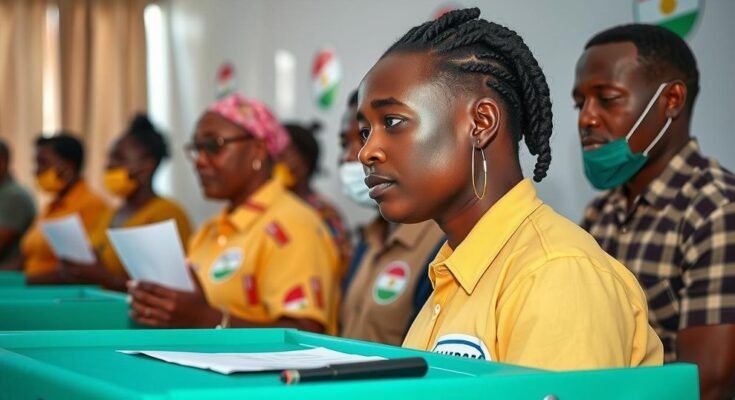Provisional results from Gabon’s referendum show overwhelming approval of a new constitution, with 91.8% support from voters. The constitution proposes limits on presidential terms and disqualifies candidates with foreign spouses. Turnout was reported at 53.54%, and the public’s sentiment is split between optimism for change and concerns about the power dynamics under the junta.
Gabon’s military leaders have revealed that a significant majority of voters approved a new constitution during a recent referendum. Provisional results indicated that approximately 91.8 percent of the electorate supported the new charter, which seeks to redefine presidential powers while limiting the office to a maximum of two seven-year terms, abolishing the prime minister role, and prohibiting the transfer of power through family ties. Registered voters were encouraged to show up at the polls amidst a campaign dominated by government messaging urging participation.
The turnout was reported to be 53.54 percent, which was lower than previously expected. Notably, the newly proposed constitution mandates that presidential candidates must be Gabonese citizens, which disqualifies former ruler Ali Bongo Ondimba due to his marriage to a non-Gabonese. Transitional President Brice Oligui Nguema hailed the referendum as a significant advancement, reflecting the junta’s commitment to a transparent electoral process, although critics argue that the political environment remains heavily skewed in favor of the current ruling authority.
This constitutional reform process occurs against a backdrop of public discontent regarding governance and economic struggles, particularly concerning unemployment and rising living costs. As few serious incidents were reported during the voting process, observers await the official results from the constitutional court to confirm the outcome of this pivotal vote in Gabonese political history.
The recent referendum in Gabon represents a critical shift in the nation’s governance following a military coup in August 2023 that ousted Ali Bongo Ondimba, who had served for 14 years. The proposed constitution aims to curtail potential abuses of power by regulating presidential terms and disqualifying candidates based on familial connections. Citizens are expressing a mix of support and skepticism regarding both the political changes and the implications for their personal circumstances, including economic conditions and job security. Once the final results are tallied by the constitutional court, the implications for democracy and governance in Gabon will become clearer.
In summary, the significant approval of Gabon’s new constitution by voters reflects a willingness to embrace change after a tumultuous political period marked by military intervention and longstanding concerns over governance. While the provisional results indicate a shift towards more structured presidential authority, challenges remain regarding the credibility of the electoral process and the views of the populace on the junta’s intentions. This critical juncture will influence Gabon’s political landscape leading up to the presidential elections in 2025.
Original Source: www.tiogapublishing.com




